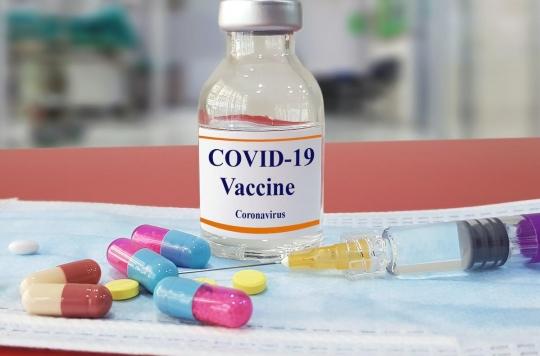Trials of the drug anakrina, which first showed encouraging results for treating severe forms of Covid-19, were stopped following unexplained excess mortality. The vaccine candidate developed by Oxford and AstraZeneca resumes its trials conducted around the world.

- Trials using anakrina to treat severe forms of Covid-19 and carried out on around thirty patients have been suspended following unexplained excess mortality.
- Interrupted last September, clinical trials on the vaccine candidate developed by Oxford and AstraZeneca have resumed in the United States.
- The results of these trials, in phase 3, are expected by the end of the year.
The race for treatment and a vaccine against Covid-19 is strewn with pitfalls. The various clinical trials progress according to the reactions of the volunteers who receive the test treatments. Trials on the drug anakrina, developed by researchers at the CHU de Tours, to treat patients with Covid-19 have come to a halt after unexplained excess mortality among the participants. The vaccine candidate developed by Oxford scientists in partnership with the pharmaceutical company AstraZeneca is resuming its trials for a time interrupted after a patient fell ill in an unexplained way last September.
The anakrina responsible for unexplained excess mortality
Clinical trials on the drug anakrina, initially used to treat rheumatic diseases, have been suspended for the time being. A clinical trial which evaluates its effectiveness in the management of patients infected with Covid-19 presented an unexplained excess mortality among volunteers, said the drug agency ANSM in a press release published on October 29. This trial, conducted by researchers from the University Hospital of Tours on around thirty patients, showed “a deleterious effect of anakinra [qui] cannot be excluded as the information available at this stage does not explain this difference” with the group that was not treated with this drug, justified the ANSM. Other clinical trials with anakinra in the context of Covid-19 are also suspended, the ANSM said.
The anakirina, at first, gave results judged “encouraging” by researchers from the Paris Saint-Joseph Hospital Group (GHPSJ) in a study published on May 29 in the journal The Lancet Rheumatology. This drug has reduced the risk of death for patients with severe forms. By targeting interleukin-1 (IL-1), one of the cytokines involved in the inflammatory storm that triggers acute respiratory distress, anakrina has brought hope for an effective treatment to treat severe Covid-19 infections. 19.
The results of the vaccine candidate expected by the end of the year
The vaccine candidate developed by researchers at the British University of Oxford, in partnership with the pharmaceutical company AstraZeneca, has returned to the clinical trial phase. The latter had been interrupted last September after a patient fell ill in an unexplained way. The FDA, the American drug agency, announced in a press release published on October 23 the resumption of clinical trials of the vaccine in the United States, considering them safe.
These trials had also already resumed in the United Kingdom, Brazil, South Africa and Japan. “The resumption of clinical trials around the world is great news as it allows us to continue our efforts to develop this vaccine to help defeat this terrible pandemic. We should be reassured by the care taken by independent regulators to protect the public and ensure the vaccine is safe before it is approved for use.”, welcomed Pascal Soriot, CEO of AstraZeneca in the press release.
This vaccine, called AZD1222, is in phase 3 of clinical trials, the last with possible commercialization. The pharmaceutical company hopes to present the final results by the end of the year.

.















